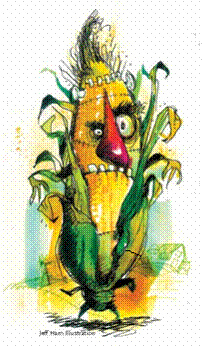When Forbes magazine declared Monsanto as the Company of the Year for 2009, millions of surprised people were forced to reevaluate their opinions about a major corporation. Now they no longer trust Forbes.
Monsanto is one of the most despised corporations on earth. This is the eighth in a series of articles that expose their not-so-hidden dark side and how, if unrestrained, Monsanto could unleash a cataclysm. Indeed, it has already started...
Part 8 of 10
Deadly Deception in India
Monsanto ran a poster series called, "TRUE STORIES OF FARMERS WHO HAVE SOWN BT COTTON." One featured a farmer who claimed great benefits, but when investigators tracked him down, he turned out to be a cigarette salesman, not a farmer. Another poster claimed yields by the pictured farmer that were four times what he actually achieved. One poster showed a farmer standing next to a tractor, suggesting that sales of Bt cotton allowed him to buy it. But the farmer was never told what the photo was to be used for, and said that with the yields from Bt, "I would not be able to buy even two tractor tires."
In addition to posters, Monsanto's cotton marketers used dancing girls, famous Bollywood actors, even religious leaders to pitch their products. Some newspaper ads looked like news stories and featured relatives of seed salesmen claiming to be happy with Bt. Sometimes free pesticides were given away with the seeds, and some farmers who helped with publicity got free seeds.
- India News (May 6, 2005) reported studies showing a loss of about 18%.
- An independent study in Andhra Pradesh "done on [a] season-long basis continuously for three years in 87 villages" showed that growing Bt cotton cost 12% more, yielded 8.3% less, and the returns over three years were 60% less. (PDF)
- Another report identified a yield loss in the Warangal district of 30-60%. The official report, however, was tampered with. The local Deputy Director of Agriculture confirmed on Feb 1, 2005 that the yield figures had been secretly increased to 2.7 times higher than what farms reported. Once the state of Andhra Pradesh tallied all the actual yields, they demanded approximately $10 million USD from Monsanto to compensate farmers for losses. Monsanto refused.
In Andhra Pradesh, where 71% of farmers who used Bt cotton ended up with financial losses, farmers attacked the seed dealer's office and even "tied up Mahyco Monsanto representatives in their villages," until the police rescued them. (PDF)
In spite of great losses and unreliable yields, Monsanto has skillfully eliminated the availability of non-GM cotton seeds in many regions throughout India, forcing farmers to buy their varieties.
Farmers borrow heavily and at high interest rates to pay four times the price for the GM varieties, along with the chemicals needed to grow them. When Bt cotton performs poorly and can't even pay back the debt, desperate farmers resort to suicide, often drinking unused pesticides. In one region, more than three Bt cotton farmers take their own lives each day. The UK Daily Mail estimates that the total number of Bt cotton-related suicides in India is a staggering 125,000.
International bestselling author and filmmaker Jeffrey M. Smith is the executive director of the Institute for Responsible Technology. His first book, Seeds of Deception: Exposing Industry and Government Lies About the Safety of the Genetically Engineered Foods You're Eating, is the world's bestselling and #1 rated book on GMOs. His second, Genetic Roulette: The Documented Health Risks of Genetically Engineered Foods, documents 65 health risks of the GM foods Americans eat everyday. Both are distributed by Chelsea Green Publishing. To help you choose healthier, non-GMO brands, use the Non-GMO Shopping Guide.

